Getting out of the hospital is a step toward recovery. Still, when the transfer is done too quickly or not properly planned, it can pose a significant safety risk to the patient.
Unsafe discharge occurs when a patient is sent home or moved to another facility prematurely, without the necessary follow-up support for their well-being.
In 2014–15, the Parliamentary and Health Service Ombudsman (PHSO) investigated 6,286 complaints about hospital discharge that had been poorly managed.
It is not just about incomplete communication or missing paperwork. It is about people, confused, left alone, with no medication, being left at risk.
This guide will explain what unsafe discharge from a hospital in the UK is, why it happens, what the NHS rules are, and most importantly, what you can do to protect yourself or the person you care for.
What is an Unsafe Discharge?
An unsafe discharge means a hospital sends a patient home before it’s considered medically, physically, or practically safe for the patient to do so.
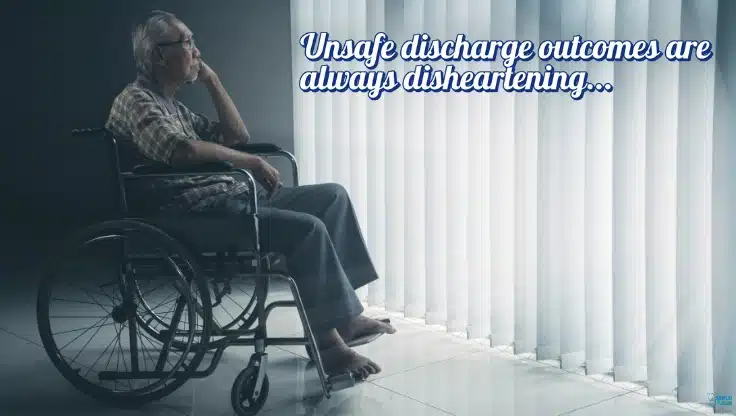
It might mean that:
- A patient is still unwell / feeling pain
- There is no diagnosis or symptoms left unresolved
- Medications have not been explained or prescribed correctly
- Care or support is not in place
- Family/carers are not informed in a timely fashion
- Sent home late at night/weekend
Discharge readiness is not only about medical assessments – it is whether the patient can safely cope outside of the hospital environment.
This process in a UK hospital typically involves assessment, coordination with carers, and the creation of a detailed plan as outlined in the discharge letter.
If any of these steps are bypassed, it is likely to result in a failed patient handover, putting the patient at risk of injury or readmission.
Real-Life Examples
Unsafe discharges from hospitals in the UK aren’t unusual — these are some cases commented on in the NHS review from a few different patients’ complaints:
- Elderly and Alone at Night: An 85-year-old woman with dementia was released at 11 pm, and her daughter was not informed. She was alone in the house the next morning, there was no food, no heating and no care.
- Fatal Misdiagnosis: A woman in her 90s was sent home with chest pain; after a short time, she collapsed and died – a severe case of unsafe discharge from the hospital in the UK.
- No Carer Informed: A man in his late 80s was moved out of hospital when his carer was away. He had no medication, no food, and no idea of what to do.
Each case highlights that discharging elderly patients from hospital with no support can be incredibly dangerous. These are not glitches in the system; they are avoidable failures.
Why Unsafe Discharges Happen
Unsafe discharges can happen despite good intentions from staff because of:
- Bed pressure – Hospitals are constantly trying to open beds, leading to rushed hospital transfers.
- Social care delays – If care packages aren’t available, patients may still be sent home, especially if their stay seems prolonged.
- Lack of communication – Family, carers or GPs may not be notified in time.
- Out-of-hours transfers – Nighttime and weekend hospital releases mean fewer services (e.g. transport, pharmacy) are available.
- Staffing shortages – NHS teams under pressure may skip proper transition from hospital planning.
These pressures are substantial. However, skipping steps in the discharge planning checklist in the hospital can result in serious harm.
Table: Safe vs Unsafe Discharge
| Safe Discharge | Unsafe Discharge |
|---|---|
| Medically stable and fit to go | Still in pain or symptoms unresolved |
| Medications explained and given | No medication provided or unclear instructions |
| Clear follow-up plan and contacts | No GP handover or district nurse assigned |
| Carers/family informed in advance | Family finds out later |
| Moved during daytime hours | Moved at night or over the weekend |
| Support at home arranged (e.g. carers, aids) | Sent home to empty house with no care |
Knowing the criteria for safe discharge from the hospital helps families ask the right questions and challenge poor planning.
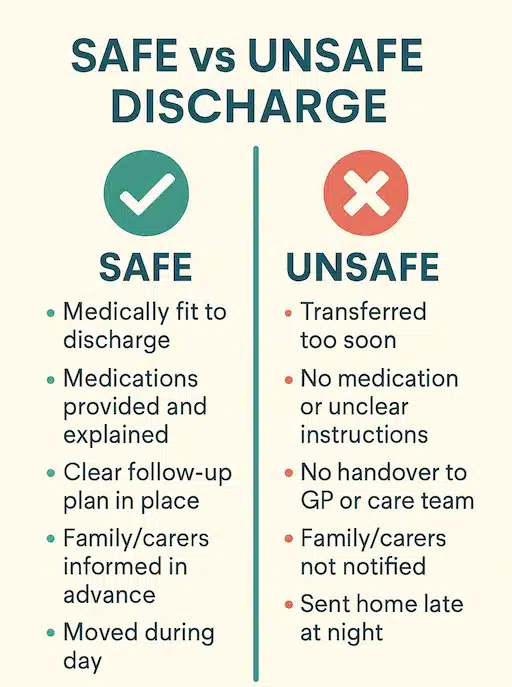
NHS Rules, Fines & Policies
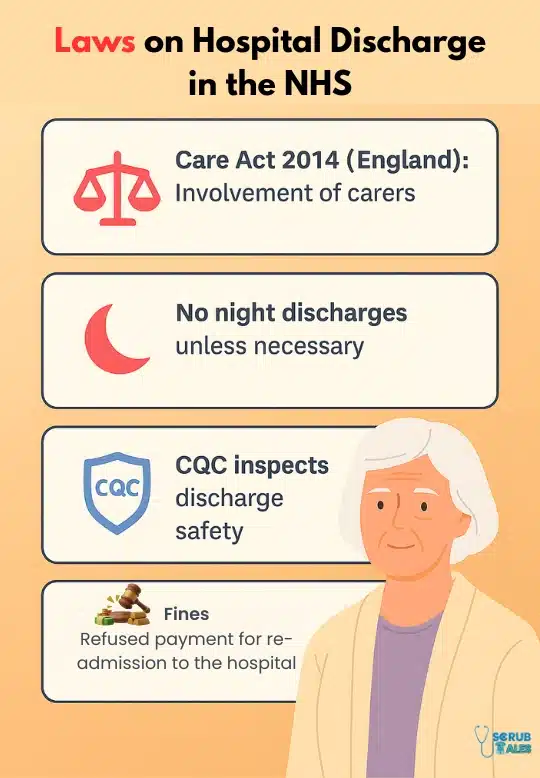
Hospitals should follow best practice guidelines when discharging a patient:
Legal duties
In England, this is the Care Act 2014 and the requirement to involve carers. In Scotland, there are similar provisions under the Carers (Scotland) Act 2016.
No Night-Time Transfers
NHS England discourages hospital transfers during the night unless absolutely necessary; most services are unavailable, and the risk is higher.
Discharge to assess
Hospitals should first sort short-term care and then evaluate the need for long-term care at home, not while stuck on a ward.
CQC monitoring
The Care Quality Commission (CQC) checks whether patient handover processes are safe.
Fines
Suppose a patient is readmitted within 30 days of discharge and it is identified that poor planning and/or unsafe practice contributed to the readmission. In that case, the hospital may be refused payment for the readmission – it is a retrospective form of penalty.
Nonetheless, many families still report unsafe discharges or poorly planned decisions. This is why it is essential to understand your rights.
Elderly Patients: A Special Risk Group
The National Audit Office reported that 85% of all delayed discharges involved patients aged 65 or older. Over 1.15 million bed days were lost in one year alone due to poor coordination.
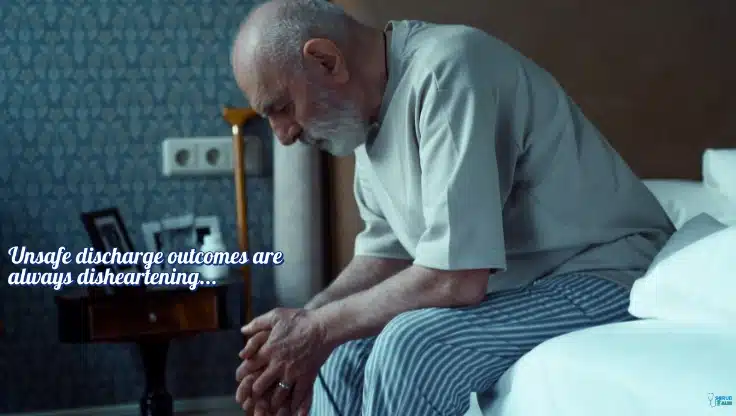
Elderly patients are the most vulnerable to unsafe discharges from the hospital when moved from a hospital – here are a few reasons why:
- Memory or confusion: Dementia or delirium means they might not understand or remember the instructions.
- Physical weakness: They may fall, miss medication, or be unable to perform basic tasks without help.
- Carer dependency: Many people rely on family or formal carers. If they are not warned, they may return to “no help.”
- Higher complication rates: Older adults can deteriorate quickly if transferred back to unsafe conditions.
Hospitals should have enhanced and special precautions. However, this is not always done, meaning families must take a proactive role in such important decisions.
What You Can Do as a Patient or Carer
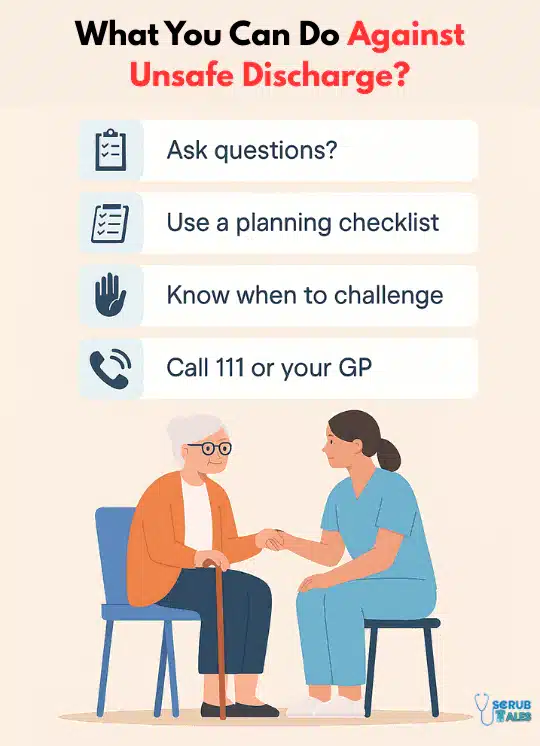
1. Ask Questions
So you can make an informed decision and lower the risk of an unsafe discharge from the hospital in the UK, here are some questions to ask before discharge:
- Is the patient medically fit to go?
- Who will assist the patient at home?
- Are they moved with their complete medication and knowledge of how to take it?
- Is their follow-up appointment or visit pre-arranged?
- What will happen if something goes wrong?
- What is the hospital discharge policy supporting this?
2. Use a Hospital Release Checklist
Check if the following points have been covered before you or a loved one leaves the hospital.
- Diagnosis explained
- Written discharge summary given
- Prescriptions/TTOs provided
- Carers informed in advance
- Transport arranged
- Equipment (e.g. walking aids) arranged
- The time of transfer is safe for the patient (not leaving the hospital late at night)
3. Know when to challenge
- You have a right to challenge the decision (do not confuse with the right to refuse). This is covered under laws on hospital discharge.
- If so, you can talk to the discharge co-ordinator or PALS team.
- Request a review or delay in the hospital release.
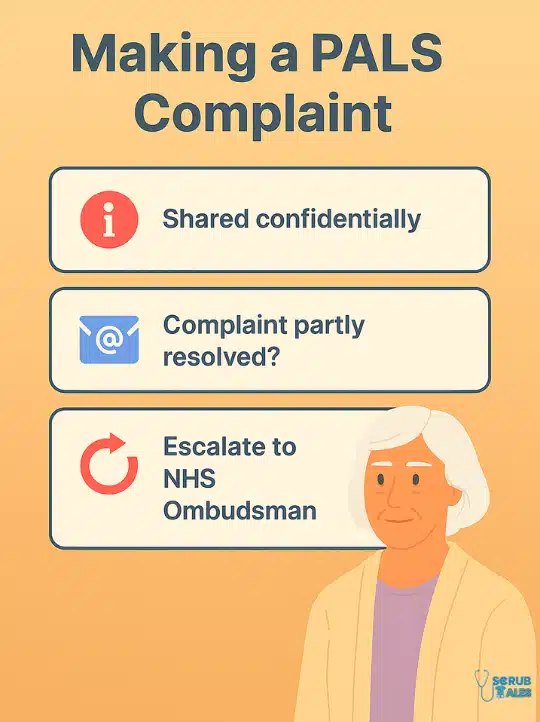
4. If the problem happens after leaving
- Contact your GP or NHS 111.
- Ask your council for urgent social care support.
- If you experience unsafe practices, you can report this to the hospital or the Care Quality Commission.
The best way to protect yourself from a failed discharge is to stay on top of it and know your rights, as well as your post-release expectations.
Final Thoughts
Unsafe discharge from the hospital isn’t just inconvenient; it affects people’s health, safety, and dignity.
It can mean missing a care plan, being transferred at midnight with no family, or other potentially devastating situations, any of which can be brutal, humiliating, or damaging for older adults.
But they can be avoided.
By knowing your rights, recognising risky situations, and asking the right questions, you can keep yourself or your loved ones from being put at risk.
A safe discharge isn’t just about a bed being free; it’s serving the patient so that they go home safely and with confidence.


